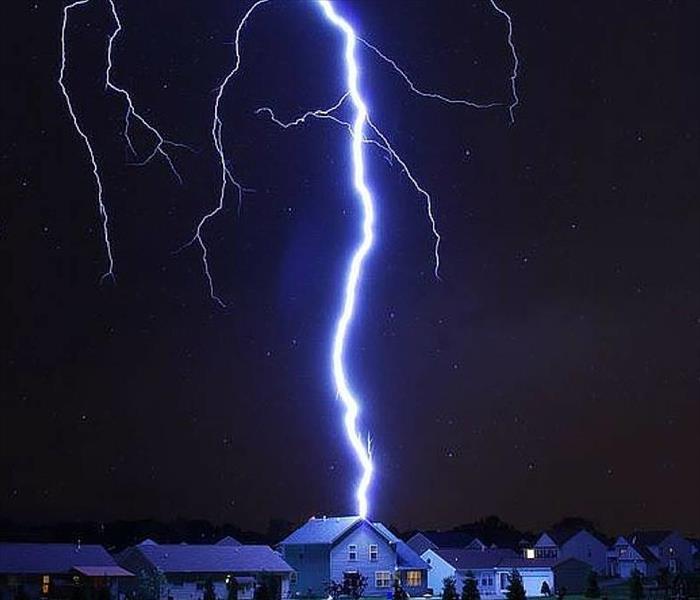Lightning Safety
7/20/2016 (Permalink)
With these ups and downs in the weather, the atmosphere becomes quite unstable thus spurring thunderstorms. Most of the time, these are just heavy downpours that last about 20-30 minutes and leave the day feeling much more humid and hot than when it arrived. There are some of these afternoon visitors that can have some pretty severe components, including lightning.
Lightning is one of the leading causes of weather-related fatalities. Ohio has had 34 deaths from 1990-2003 ranking in at #4 for all 50 states according to data collected by the National Oceanic and Atmospheric Administration (NOAA). You can easily avoid being a statistic by following these simple safety tips.
Be aware. Check the forecast before participating in outdoor activities. If it calls for thunderstorms, postpone your trip or activity, or make sure adequate safe shelter is available.
Go indoors.Remember the phrase, “When thunder roars, go indoors.” Find a safe, enclosed shelter when you hear thunder. Safe shelters include homes, offices, shopping centers, and hard-top vehicles with the windows rolled up.
Avoid windows, doors, porches, and concrete. Do not lie on concrete floors and avoid leaning on concrete walls. Lightning can travel through any metal wires or bars in concrete walls or flooring.
Avoid water. Do not bathe, shower, wash dishes, or have any other contact with water during a thunderstorm because lightning can travel through a building’s plumbing.
Avoid electronic equipment. Do not use computers, laptops, game systems, washers, dryers, stoves, or anything connected to an electrical outlet. Lightning can travel through electrical systems, radio and television reception systems, and any metal wires or bars in concrete walls or flooring. Equip homes and offices with whole-house surge protectors to protect appliances.
Watch for Developing Thunderstorms - Thunderstorms are most likely to develop on spring or summer days but can occur year round. As the sun heats the air, pockets of warmer air start to rise and cumulus clouds form. Continued heating can cause these clouds to grow vertically into towering cumulus clouds, often the first sign of a developing thunderstorm.
Seek shelter before an approaching thunderstorm - Lightning can strike as far as 10 miles away from where it is raining. That’s about the distance you can hear thunder. If you can hear thunder, you are within striking distance. Seek shelter immediately! When thunder roars, go indoors!
Minimize the risk of being struck during outdoor activities - Most lightning deaths and injuries occur in the summer. During organized outdoor sporting events, coaches, camp counselors and other adults must stop activities at the first clap of thunder to ensure that everyone has time to get to a large building or enclosed vehicle. Leaders of outdoor events should have a written emergency plan that all staff are aware of and enforce.
Things to avoid while indoors - While inside, stay off land lines or corded phones, computers and other electrical equipment that put you in direct contact with electricity. Stay away from indoor and outdoor pools, bathtubs, showers, and other plumbing. Buy surge suppressors for key equipment. Install ground fault protectors on circuits near water or outdoors. When inside, wait 30 minutes after the last sound of thunder and lightning before going out again.
Helping a Lightning Strike Victim. - If a person is struck by lightning, call 911 and get medical care immediately. Cardiac arrest and irregularities, burns and nerve damage are common injuries when people are struck by lightning. You are not in physical danger when helping a lightning victim. Knowing first aid measures, which include cardiopulmonary resuscitation (CPR), can help lightning-strike victims survive. American Red Cross chapters and local fire departments often offer first aid and CPR classes.
Lightning is dangerous - By knowing what to do during severe weather incidents, you can greatly increase your safety and the safety of those around you. At the first clap of thunder, go inside a preferably large building or fully enclosed vehicle and wait 30 minutes after the last sound of thunder and lightning before going back outside. Remember: When thunder roars, go indoors!
SERVPRO of Huron & East Seneca Counties proudly serves you and specializes in fire, smoke, mold, water and biohazard damage to both commercial and residential properties. Capable of handling any size loss and working with all types of insurance providers, SERVPRO is available 24 hours a day, 365 days per year. We cover areas like Tiffin, Fremont, Norwalk, Willard, Bellevue, Carey, New London, Bloomville, Attica, and Monroeville. For more information, visit http://www.SERVPROhuroneastsenecacounties.com or call us at 419-443-1790.






 24/7 Emergency Service
24/7 Emergency Service
